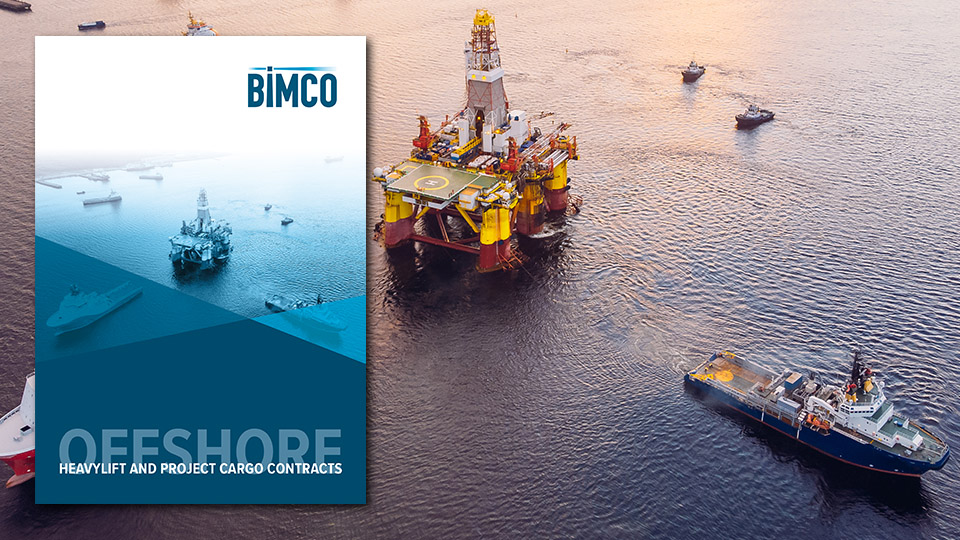LNG Bunker Operational Clause for Time Charter Parties
Overview
In 2021 BIMCO initiated a project to develop a suite of LNG fuel clauses for time charter parties. The number of LNG fuelled ships in operation is growing steadily and the suite reflects the need to have bespoke clauses in time charters for these ships.
The LNG clauses cover matters related to the LNG quality, delivery/redelivery, gas-freeing and cooling down and an operational clause. For dual-fuel ships the clauses are intended to be used together with the existing BIMCO bunker clauses for conventional fuel oils.
The current suite of LNG fuel clauses for use in time charter parties also consists of:
LNG Fuel Gas freeing and Cool down Clause
LNG Bunker Operational Clause for Time Charter Parties
Background
This clause deals with the operational requirements when a ship uses LNG fuel. The focus is on the ship’s compliance with LNG bunkering facilities. The clause covers LNG supplied via ship-to-ship transfer and directly from terminals. The compatibility aspect is very important as not all LNG fuelled ships are compatible with every facility and the charterers often have supply contracts with a limited number of LNG providers.
BIMCO LNG Fuel Operational Clause for Time Charter Parties
- (i)The Owners warrant that, at the date of this Charter Party, the Vessel is compatible with the following LNG bunkering facilities (ashore or afloat) [insert named LNG bunkering facilities or reference to list] (Compatible Facilities) for the purposes of receiving LNG fuel.
(ii) In the event of subsequent changes to the configurations of the Compatible Facilities, or if the Charterers request the Vessel to load LNG fuel at any other LNG bunkering facility, then any steps required to ascertain the Vessel’s compatibility shall be undertaken by the Owners at the Charterers’ time and expense.
(iii) If, subject to subclause (a)(iv), a modification to the Vessel and/or carrying additional equipment is necessary to maintain compatibility with Compatible Facilities or make the Vessel compatible with other LNG bunkering facilities (Compatibility Modification), the Charterers may request that the Owners carry out such Compatibility Modification at the Charterers’ time and expense, always subject to the Owners’ prior consent which shall not be unreasonably withheld.
After it has been confirmed that there is no need for a Compatibility Modification or a Compatibility Modification has been confirmed and completed, such LNG bunkering facility shall be deemed to be one of the Compatible Facilities. Any steps required to ascertain whether the Vessel remains compatible with Compatible Facilities shall be undertaken by the Owners at the Charterers’ time and expense. Any additional equipment provided by the Charterers shall remain their property and shall be removed by the Charterers at their time and expense prior to redelivery.
(iv) If the Vessel’s Class or changes to the laws and regulations of the Vessel’s flag state require a modification to the Vessel and/or the carrying of additional equipment to ensure compatibility with Compatible Facilities then this shall be undertaken by the Owners at their time and expense.
- (i) The parties agree that the LNG bunkering operations shall be conducted in compliance with any applicable local, regional or national laws or regulations, and the recommendations and guidelines of the Society for Gas as a Marine Fuel (SGMF).
(ii) Where the LNG bunkering operation is conducted by ship-to-ship transfer, the Charterers warrant that the LNG bunker supply vessel shall comply with any applicable local, regional or national laws or regulations, and the recommendations and guidelines of the Society of International Gas Tankers and Terminal Operators (SIGTTO).
(c) The Charterers shall have the right to have an observer present during the LNG bunkering operations at their cost and risk. The attendance of the observer shall not interfere with or delay the working of the Vessel or the LNG bunkering operations. The exercise or non-exercise of this right by the Charterers shall not reduce the obligations of the Owners in respect of the LNG bunkering operations.
(d) Subject to agreement by the Owners, which shall not be unreasonably withheld, and any applicable local, regional or national laws or regulations, LNG bunkering operations may take place during cargo operations.
(e) If the Vessel’s engines are capable of burning both LNG and any alternative fuel, then subject to the other provisions of this Charter Party and to the Owners’ obligation to comply with regulations in force regarding the types of fuel which may be used in particular ports or areas, the Charterers shall have the right to direct which fuel shall be used by the Vessel at any particular time.
Drafting team
The BIMCO suite of LNG Fuel clauses has been developed with the invaluable assistance of owners, charterers, P&I clubs and legal experts. BIMCO is extremely grateful to the following individuals for working with us and their dedication to the project:
Ms Camilla Nyhus-Møller, Höegh LNG (Chairperson)
Gerben Dijkstra, Anthony Veder
Captain Iain Scally, NYK
Mr Chris Meyer, BHP
Ms Sarah Jane Thompson, BHP
Ms Charlotte Vandeville, Affinity
Mr Jonathan Gaylor, Affinity
Mr Michael Bird, Britannia
Mr Marcus Dodds, Watson Farley & Williams
BIMCO secretariat support was provided by Grant Hunter, Head of Contracts & Clauses and Nina Stuhrmann, Manager, Contracts & Clauses.
Explanatory notes
Guidance Notes
The following guidance notes are intended to provide some background to the thinking behind the BIMCO LNG Fuel Quality Clause for Time Charter Parties. These notes explain the scope of each provision and clarify how the clause is intended to operate and the way it allocates risk between the parties. If you have any questions about the clause that we have not answered in these notes, please contact us at contracts@bimco.org and we will be happy to assist.
Subclause (a) (i) – Under this subclause the owners warrant that the ship is compatible with the named LNG bunker facilities. This is not a continuous warranty and only applies at the date of the contract. At this point in time, the parties agree to certain facilities which must either be stated in the clause or in an annex to the charter party. These facilities will be “Compatible Facilities”.
Subclause (a) (ii) - This deals with changes to the configuration of the Compatible Facilities which might require a change to the ship or other steps to maintain the ship’s compatibility. In such a case the owners must conduct the relevant analysis whilst the charterers pay for it and the ship will remain on hire. The same mechanism applies where the charterers wish to load LNG fuel at other LNG bunker facilities. The owners must perform the compatibility analysis but at the charterers’ time and expense.
Subclause (a)(iii) – This subclause deals with the consequences of subclause (a)(ii). Where a modification to the ship or carrying other equipment is required to maintain compatibility or to make the ship compatible with other LNG facilities, the charterers can ask the owners to undertake the required steps. The owners must approve such modifications and can only reject their approval where they have reasonable grounds for doing so.
This subclause also clarifies that once the ship is compatible with a new LNG bunkering facility, that facility becomes a “Compatible Facility”.
Subclause (a)(iv) – If changes to the laws of the flag state or class recommendations make modifications to the ship and/or the carrying of additional equipment necessary to ensure compatibility with the initially named bunkering facilities listed in subclause (a)(i), then these changes must be done by the owners at their time and cost. This obligation does not cover the other unwarranted LNG bunkering facilities.
Subclause (b) – This subclause deals with compliance of the LNG bunkering operations with applicable laws, regulations and guidelines. The recommendations and guidelines of the Society for Gas as a Marine Fuel (SGMF) must be complied with. If the ship is re-fuelled by ship-to-ship transfer, the Charterers warrant compliance with applicable laws and the guidelines of the Society of International Gas Tankers and Terminal Operators (SIGTTO). Since this provision deals with compliance by the supply vessel, a reference to SIGTTO and not the SGMF guidelines was considered appropriate.
Subclause (c) and (d) – These provisions are self-explanatory.
Subclause (e) – In case of a dual-fuel ship, the charterers can decide which fuel to use. This is because they arrange for the bunkering and pay for the fuel under a time charter. This right is limited however when the ship is required to burn a certain type of fuel, for example due to local legal requirements.
Related Help & Advice
Create or edit a contract
The one-stop digital shop for all the standard maritime contracts and clauses you’ll ever need.
Latest Related News
-
BIMCO adopts portfolio of four ETS clauses
The shipping industry is facing an increase in new regulations from the International Maritime Organization (IMO) and the European Union (EU) and an increase in the urgency to decarbonise. To support the industry, BIMCO has developed a portfolio of new emission trading scheme (ETS) clauses.
-
BIMCO adopts new CII clause for Voyage Charter Parties
The shipping industry is facing an increase in new regulations from the International Maritime Organization (IMO) and the European Union (EU) and an increase in the urgency to decarbonise. To support the industry, BIMCO has developed a new CII Clause for Voyage Charter Parties. The clause was adopted by BIMCO’s Documentary Committee on 11 October and is the latest addition to BIMCO’s portfolio of carbon clauses.
-
BIMCO’s CII clause adopted
The BIMCO Documentary Committee has adopted a CII Operations Clause for Time Charter Parties which will help the industry commercially navigate the complexities of the new CII regulations from the International Maritime Organization (IMO).
-
Fumigation
BIMCO providing information and guidance relating to fumigation of cargoes that are shipped under the IMSBC Code, the Grain Code and the IMDG Code.
-
BIMCO publishes EEXI Transition Clause ahead of IMO efficiency regulation
New regulation from the International Maritime Organization (IMO), which will require existing ships to reduce carbon emissions, is due to enter into force in just under one year. As compliance will benefit to a large extent from co-operation between shipowners and charterers, BIMCO has developed a new clause to address the changes.
ELSEWHERE ON BIMCO
Holiday calendar
BIMCO's Holiday Calendar covers general holidays in over 150 countries, plus local holidays and working hours in more than 680 ports around the world.
Learn about your cargo
For general guidance and information on cargo-related queries.




